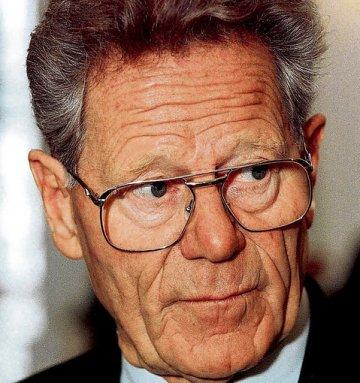By Paddy Agnew
Irish Times
May 2, 2011
http://www.irishtimes.com/newspaper/world/2011/0502/1224295868017.html
 |
| Hans Küng: highly critical of swift beatification |
ANALYSIS: Sex abuse victims and theologians among those critical of John Paul II's beatification
WHILE HUNDREDS of thousands of pilgrims gathered in Rome yesterday to pay homage to the newly "blessed" John Paul II, this most recent accolade for the late Polish pope clearly does not meet with universal approval. Veteran Vatican observers, dissident theologians and clerical sex abuse victims were just some of those who chose to disagree.
Snap, the US-based Survivors Network of Those Abused by Priests, started off the "beatification" weekend with a blistering statement that condemned the Catholic Church hierarchy for honouring "one of its own with a dismal track record" on the clerical sex abuse scandal, adding: ". . . the church hierarchy can avoid rubbing more salt in these wounds (sex abuse crimes) by slowing down their hasty drive to confer sainthood on the pontiff under whose reign most of the countless, widely documented clergy sex crimes and cover-ups took place."
Snap concludes that, given the vast number of clerical sex abuse crimes during the pontificate of John Paul II, the church should not even have considered beatifying the pope, let alone fast-tracking his sainthood.
The beatification of John Paul II, however, not only attracted the criticism of Snap and other abuse victims' groups but it was also bitterly denounced by dissident Swiss theologian Hans Küng.
In an interview last weekend with German daily the Frankfurter Rundschau , Küng says John Paul II does not merit being presented to the faithful as an example. He says: "John Paul II is universally praised as someone who fought for peace and human rights. But his preaching to the outside world was in total contrast with the way he ran the church from inside, with an authoritarian pontificate which suppressed the rights of both women and theologians."
In particular, Küng argues that John Paul's harsh treatment of Latin American liberation theologians such as Gutierrez and Boff represented the "exact opposite" of decent Christian behaviour. Küng also sees it as totally "logical" that Pope Benedict would be keen to promote the cause of his predecessor but adds: "Wojtyla and Ratzinger are the people most responsible for the chronic sickness of today's Catholic Church. Behind the sumptuous pomposity of the great Roman liturgy, there looms a total emptiness in many Catholic communities."
One of the most regularly touted criticisms of this beatification has been its fast-track time scale, given that it comes just six years after the death of John Paul II. Supporters of the late pope point to the fact that, to some extent, this is a beatification that has come about by popular acclamation, given the cries of "Santo subito" (Make him a saint immediately) that rang out in St Peter's Square on the day of his funeral.
Küng dismisses this justification, arguing that the campaign was manipulated: "I remember those so-called "spontaneous" posters in St Peter's Square � all neatly and carefully printed. The whole thing was just a con act by conservative and reactionary Catholic groups, especially those ones that are very strong in Spain, Italy and Poland."
Another authoritative voice to express reservations about the beatification was that of long-time Vatican watcher Giancarlo Zizola, writing in Saturday's La Repubblica . He said Benedict wishes to "bask in the glory of his predecessor" in order to impose a more rigorous control over the many "different Catholicisms" represented by groups and sects that range from the neo-liberal to the ultra-orthodox.
Zizola wrote that beatifications have always had a very "political" meaning within the church. For example, two radically different popes, Pius IX and John XXIII, were beatified on the same day in 2000 by John Paul II in an attempt to placate both ultra-conservative and more liberal elements within the Curia.
So keen was the late pope on this operation he ignored all sorts of reservations about Pius IX, a pope of a violent and irritable disposition who was responsible for the executions of hundreds of "revolutionaries" and common criminals. Furthermore, Pius IX, who defined the doctrine of papal infallibility at the Vatican Council of 1870, permitted the practice of publicly displaying the heads of the executed in Vatican City.
In that context, this too is a very "political" beatification. Zizola argues the "triumphs and mass gatherings" which marked John Paul's pontificate served only to hide the church's "crisis of identity", a crisis that is "now more furious than before".
The hardline, orthodox Polish pope served as a rock to which the church clung fiercely so as to avoid radical change and transformation. The danger represented by the beatification of John Paul II, concludes Zizola, is that it may be a signal, intended to reinforce the block on any future change.
Any original material on these pages is copyright © BishopAccountability.org 2004. Reproduce freely with attribution.